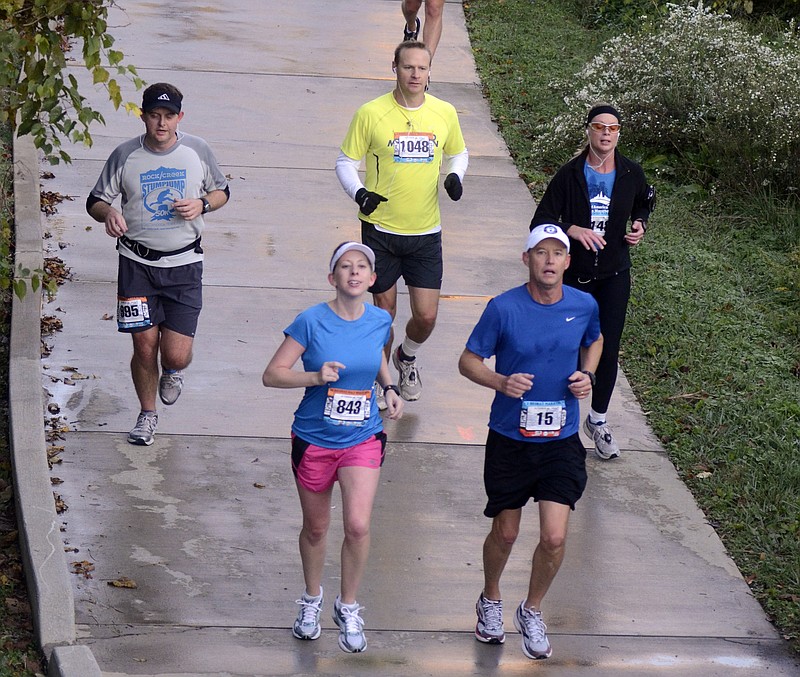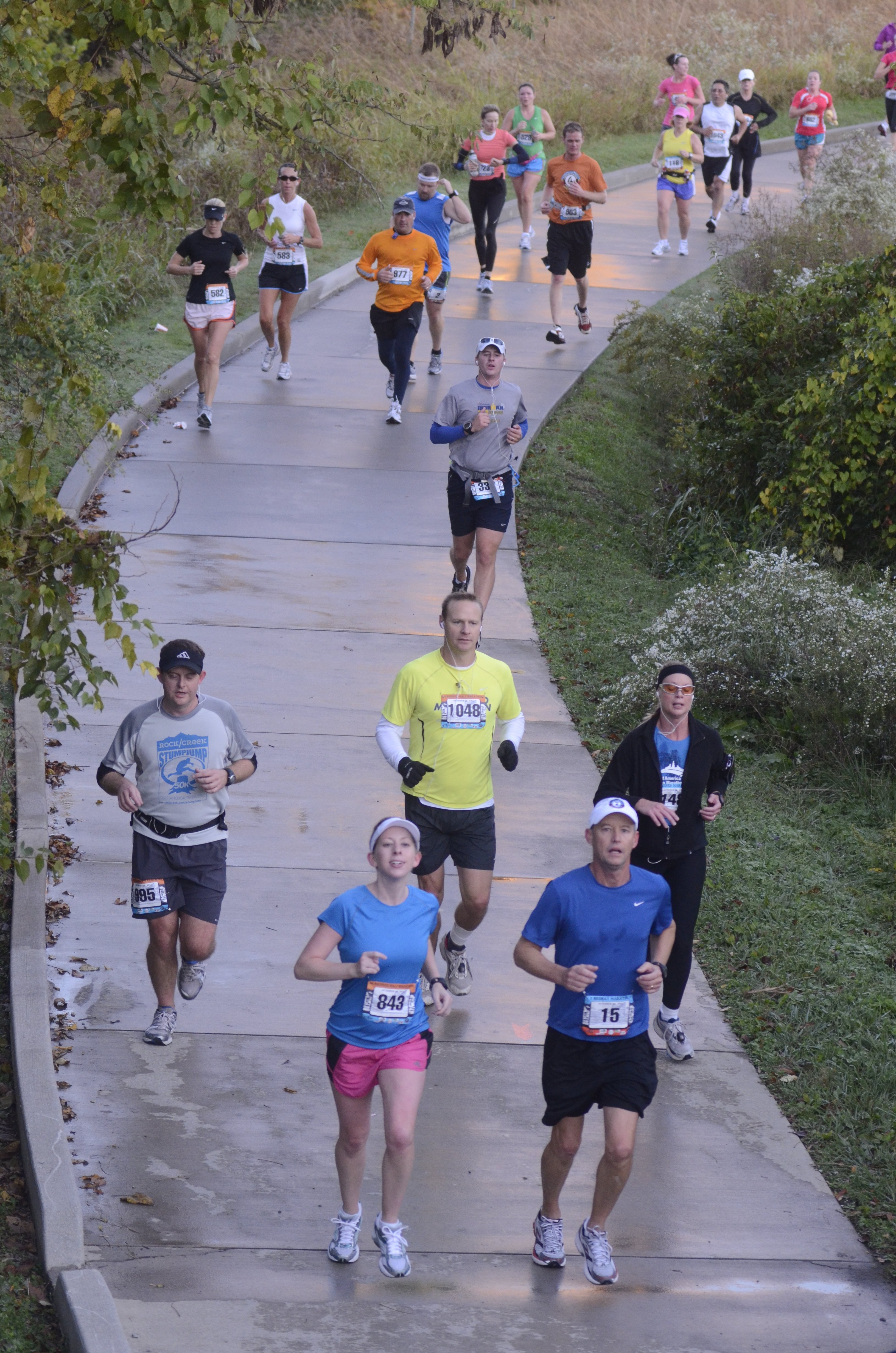On average, U.S. marathoners cross the finish line in just over four and a half hours, but long-distance runners say the real race begins months before the starting shot.
Randy Whorton, 51, is the director of Wild Trails, a local nonprofit promoting running trails in Chattanooga. Since he was 20 years old, Whorton has completed more than 100 marathons and ultramarathon-length events both on and off the trail.
The key to distance running is putting in enough miles before the event, a process that should begin six to 12 months in advance for a marathon, depending on a runner's level of fitness, Whorton said.
"The No. 1 problem with people running is that they sign up too soon before a race," he said. "Then they train for a month and aren't even remotely ready."
At 26.2 miles, running a marathon might seem like a monumental undertaking, but participation in them has been on the upswing for years. Between 2002 and 2010, the number of recorded marathon finish times increased from 325,000 to 503,000, about 55 percent, according to the website MarathonGuide.com.
When to start training for marathon and distance milestones to aim for are dependent on a runner's starting fitness level, but consistency is key. Past Chattanooga Track Club president Bill Brock, 54, has completed 30 marathons in the last 15 years and said preparing for one is not a sprint but, aptly, a marathon.
"It's all about sticking to a schedule and sticking to a discipline," he said. "It's like anything else, if you want to finish something on time, you have to do the work; you have a plan and implement it.
"Anything that takes you off course is something to avoid."
With many regional marathons scheduled for the fall, Brock said inexperienced runners should begin preparing now to build up to a 10-mile run by May or June. Every other week after that point, they need to increase that single-run mileage by two miles to get in at least a pair of 18-mile and 20-mile runs before the race starts.
Whorton refers to this distance run as one of two difficult days in a marathoner's week. The other is the "tempo run," the day runners push their bodies beyond a marathon pace for 10 miles. The tempo run teaches runners to fight through the exhaustion, a crucial skill to have when they hit the notorious runner's wall at the last six miles, a point competitors jokingly refer to as the start of the marathon's second half.
While the distance and tempo runs are crucial to the training regimen, it's equally important for runners to spend at least an hour a day putting in miles at a slower pace, Whorton said.
"You just need to get out there and run," he said. "The rest of the runs are easy. They need to be easy because you're building pace, training your body and building muscle."
By race day, Whorton and Brock agree that runners should have built up to a weekly average of 40 miles on the road.
Adam Dodson, is a member of the Carpet Capital Running Club in Dalton, Ga. He moved to Nashville last September, but in November he completed his third marathon, the Chickamauga Battlefield Marathon.
Putting in enough miles is essential to completing a marathon, but so is finding a balance between steadily increasing distance and avoiding over-training, Dodson said.
"Your body has to adjust to what you're doing to it," he said. "I listen to my body. If I'm not feeling great, I take it easy that day. Some people push through it, and they injure themselves because their body isn't ready for the pounding."
Marathons aren't for the faint-hearted or the weak-legged. Experts said those who haven't run long distances before shouldn't jump into the deep end without testing themselves on a shorter event. Brock advises newcomers to the sport sign up for a half marathon or a 10K the year before tackling a marathon.
Despite the time and energy required to prepare for marathons and other long runs, those who finish them said the feeling is worth the effort.
"It's pretty spectacular," Brock said. "You become more than you were before you started, and you have a sense of that. It's empowering."
Before he ran his first marathon with his father at age 20, Whorton was dead set against running. When he crossed the finish line for the first time, however, he was hooked.
Since then, running long distances has become a way of life. In one particularly active year, Whorton once ran two 100-mile events, one 50-mile, four 50Ks and a marathon, about 400 miles in all.
It's an addiction he said he wishes more people shared.
"Running is just glorified walking," Whorton said. "Everyone knows how to do it. There's no reason why anybody can't and shouldn't run a marathon.
"I hate that it's a bucket list thing to run a marathon before you die. ... It's absolutely something anyone can do."
REGIONAL FALL MARATHONS
The North Face Endurance Challenge
Location: F.D. Roosevelt State Park, Pine Mountain, Ga.
Date: Oct. 13-14.
Race type: Trail.
Age limit: None.
Race capacity: 250.
Registration price: $75 until Sept. 13.
Finish cutoff: Eight hours.
Website: www2.thenorthface.com/endurancechallenge/races/2011/ga/index.html
7 Bridges Marathon
Location: Renaissance Park, Chattanooga.
Date: Oct. 21.
Race type: Road.
Age limit: 16 and older.
Race capacity: 300.
Registration price: $80 until March 1.
Finish cutoff: None.
Website: www.7bridgesmarathon.com
Atlanta Marathon
Location: Atlantic Station, Atlanta.
Date: Oct. 30.
Race type: Road.
Age limit: 18 and older.
Race capacity: None.
Registration price: $85 until June 30.
Finish cutoff: Six and half hours.
Website: www.atlantamarathon.org
Chickmauga Battlefield Marathon
Location: 6th Cavalry Museum, Fort Oglethorpe, Ga.
Date: Nov. 10.
Race type: Road.
Age limit: .
Race capacity: .
Registration price: To be announced.
Finish cutoff: Six hours.
Website: www.battlefieldmarathon.com.

